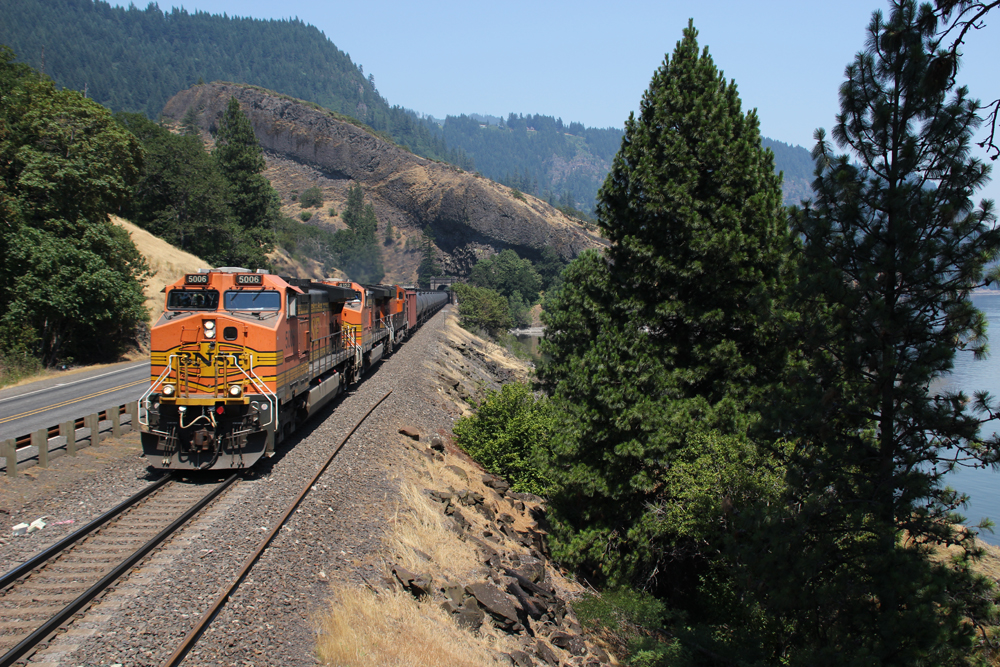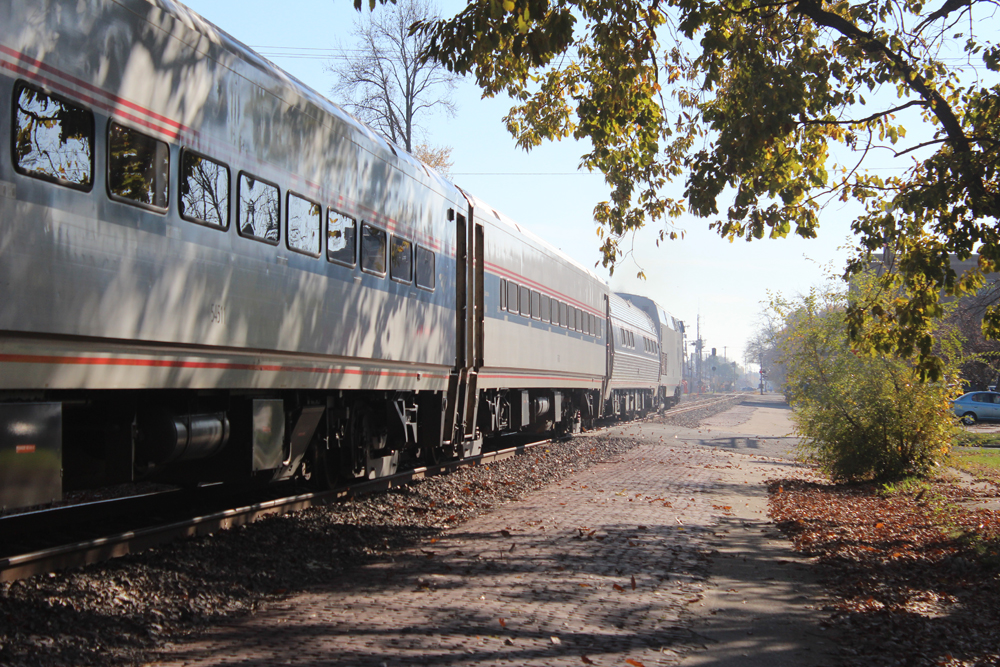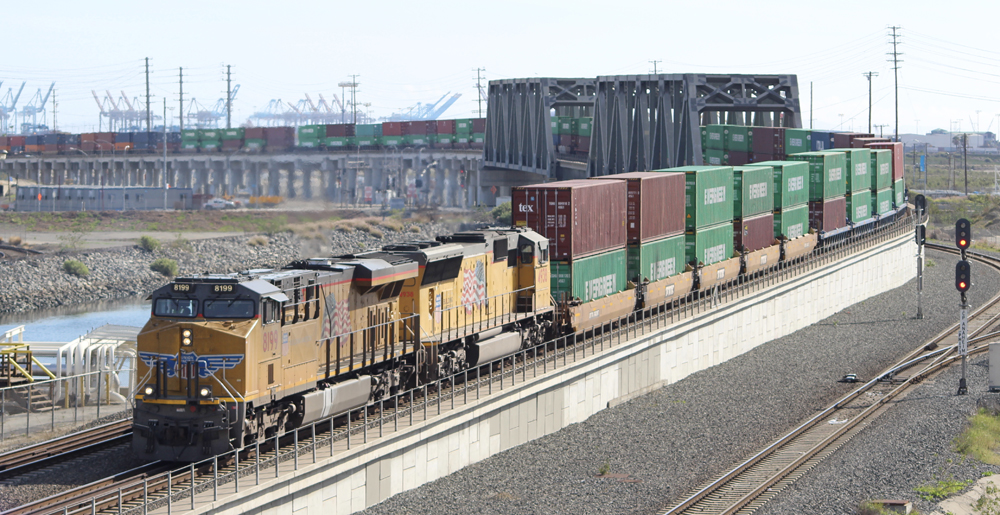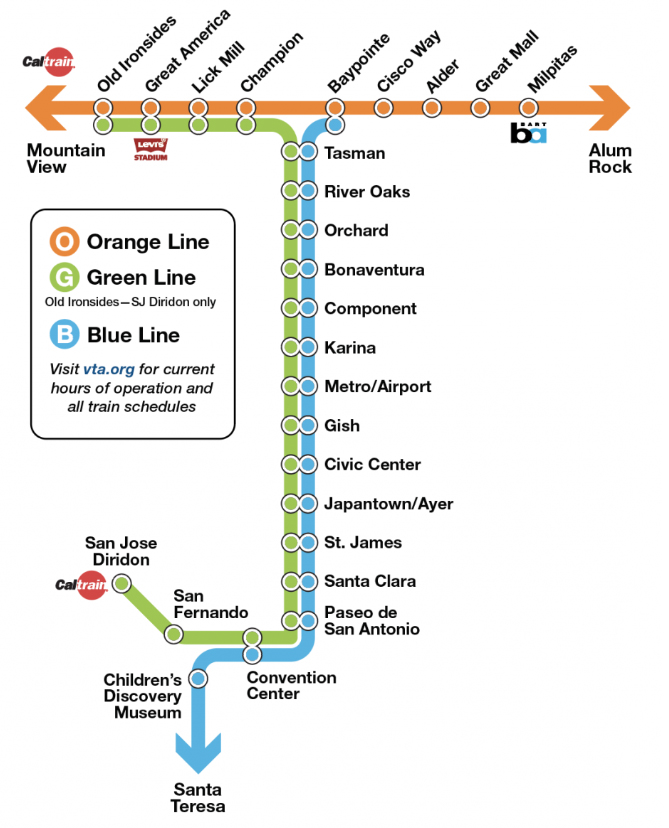
ANACORTES, Wash. — BNSF Railway violated terms of an easement agreement with the Swinomish Indian Tribal Community by running 100-car trains of crude oil across the Swinomish reservation in Anacortes for years, a federal judge ruled Monday.
The Seattle Times reports that U.S. District Court Judge Robert Lasnik said in a written order Monday that BNSF unilaterally decided to increase the number of trains and cars crossing the reservation, without the tribe’s consent, between September 2012 and May 2021 “in pursuit of profits.” A 1991 agreement allowed trains traveling in each direction to carry no more than 25 cars per day and required the railroad to tell the tribe about the “nature and identity of all cargo.”
A second phase of the trial will consider the tribe’s claim for damages.
The tribe learned a nearby refinery would begin receiving crude oil trains through a county planning document in 2011. BNSF first contacted the Swinomish about track usage the following year, according to court documents, but the tribe at no point approved the movement of unit oil trains, agreed to increase the limitations, or waived its right to approval, Lasnik wrote in his decision. He ruled that the railroad “trespassed on Indian lands and is liable for the damages caused by its overburdening of the easement.”
A BNSF spokeswoman declined to comment on the ruling, the Times reports.
The decision came just days after a BNSF train derailed on the Swinomish reservation, spilling diesel fuel from the locomotives [see “Improperly lined derail led to BNSF derailment …,” Trains News Wire, March 23, 2023]. The tribe has said it is concerned a rail accident could foul waters along the right-of-way where it has treaty-protected fishing rights.














Two questions. Is it possible to re-route the line around the 2500′ on the reservation? And is it cheaper than lawyers?
I actually looked at this. The Swinomish Reservation actually goes out into Padilla Bay as part of their fishing rights. So BNSF just can’t move thier ROW out further into the bay with some complications, like building a new swing bridge.
The best way (IMHO) is to have BNSF put in a switch at Allen and run the new ROW west to Leary Point and build a bridge across Padilla Bay with a new drawspan over the dredged channel just east of the refinery and then have it join the existing ROW. This would bypass any complications with the tribal authorities, but it will cost them a bundle to build.
Avoid the tribes, yes, new conflict with the greens, absolutely.
If you read the Seattle Times article, it noted that the original railroad “stole” the easement and constructed the railroad on tribal land without permission in 1889.
There was a national movement in the 1980’s through the Indian Affairs office that several railroads were running on tribal lands without any legal agreements in place.
So each tribe went through to verify they had the legal framework in place to allow these railroads.
The contracts the railroads signed are no different than a treaty with a sovereign nation. In the case of BNSF, they actually notified the tribe of the proposed changes from the 1991 agreement and wanted to negotiate a new easement agreement.
The tribe refused. So BNSF did what they wanted under the umbrella of their common carrier status and notified local US authorities of the traffic changes.
Tribe then filed suit to enforce the treaty.
Unfortunately for BNSF, the tribal reservation is a predecessor to the 1889 railroad being built. So that makes the railroad an ursurper to the land. BNSF will have to pay up, remove the rails or find another way to serve the refinery.
What does a casino have to do with this??? Where’s your proof the “Indians” tampered with the track? Maybe somebody tampered with the track in Palestine, PA.
Now I get it, Indians tamper with derail to enforce lease and shakedown the railroad Put them in jail and pat them $25 for compensation and sue them for a couple hundred thousand for malicious act
No BNSF is essentially operating on the land of a sovereign nation. What the Native Americans are now.
I would suspect that the tribe probably got to rewrite an easement that was originally written in the 1890’s by the Bureau of Indian Affairs. Frequently these easements had a token amount for lease of tribal lands. Say a dollar a year. When the tribe got control BN may have been thinking the railroad was going to abandon the line so agreed to something that supported what was running at the time, and not having any idea that they would have any reason to run big trains. The refinery was probably getting Alaska oil and shipping refined products locally by truck.
See what crude by rail gets you. This ought to be interesting. I doubt the tribe will sell the land. And BNSF can’t use eminent domain against a sovereign nation.
And tribe owned casinos do not operate at a profit? Seems an odd comment.
What was it with BN management back in the day. First this, then MRL.
The big question on appeal is going to be, does interstate commerce supercede even agreements with Native American Tribes?
Something doesn’t add up here. Why would BNSF (allegedly) agree to these (alleged) terms? Makes no sense.
Yes, but in 1991, this would have been BN. Was this line relocated to cross the reservation in 1991? Or was this agreement a lease option of a prior lease agreement, and this term was added with the renewal?
An obvious point perhaps, but in 1991, the Burlington Northern wasn’t running these 100-car unit oil trains to the Marches Point refineries (near Anacortes). At the time, there were only few local freights operating between the Burlington, WA yard and Anacortes and so this agreement and the mandated train length of no more than 25-cars was likely deemed adequate for BN’s needs then.
Perhaps short-sighted on BN management’s part, but they did sign the easement, which is (presumably) legally binding to the current day.
The timing of the BNSF Anacortes turn derailment on the Swinomish Reservation was unfortunate, coming as it did just before this civil trial between the Tribe and the BNSF Railway began.
Yes, the BNSF Railway will undoubtedly appeal this decision, but one does wonder about their legal standing, given that the 1991 easement agreement with the Tribe was very explicit about the length (and number?) of trains permitted to operate over the easement.
And yes, it was only 2,500 feet of “easement” on tribal land, but whether it is 2,500′ or whatever the amount of “easement” is, it doesn’t matter, it’s still tribal land that they have an “easement” across (and presumably must follow the conditions of the agreed-to legal easement).
According to Google maps the easement is only about 2500 feet on a portion of the reservation. Not sure how you could over burden the easement.
Breaking an agreement or Treaty with a Tribe? Why that’s unheard of….Right???
A lot (most?) of 19th century Indian wars were the result of breaking a treaty.
If the 1991 agreement is a legal contract stating train length over tracks on tribal land, any other arguments are simply rants. It doesn’t matter what the cause of the derailment was…
If you are a landlord and your lease states “x” number of people are allowed to use your property, but “x+10” live there, you gave the right to enforce the lease. Contracts are legal agreements with force of law.
How can a railroad “trespass” on it’s own rails? They shipped more product “in pursuit of profits?” What a horribly capitalistic idea!
You trespass when you are on an easement and don’t meet the terms of it. If you gave the power company an easement to put up a power pole, it would not give you the right to put up a toxic waste dump instead.
The reference in pursuit of profits is a slam at the railroads assertion that they did the violation to meet their duty as a common carrier.
Was not this train affected by a misaligned derail? Strange coincidence if that is the case
That is the derailment that just happened, it was mis-aligned derail.
Let’s see how this plays out on appeal.